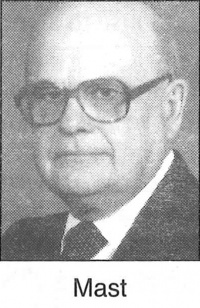If this site was useful to you, we'd be happy for a small donation. Be sure to enter "MLA donation" in the Comments box.
Mast, Russell Lowell (d. 2007)
Mennonite Weekly Review obituary: 2008 Nov 3 p. 6
Birth date:
text of obituary:
By Melvin D. Schmidt
As a college sophomore straight from the wheat fields of Kansas, aspiring to become a Mennonite preacher, I enrolled at Bethel College in 1956. My heroes were the men I considered the great preachers of the day. I read everything I could find on Peter Marshall and considered A Man Called Peter the greatest movie of all time. I admired Mennonite preachers such as J.E. Hartzler and Andrew Shelly, often driving miles to hear them preach.
And then, I fell under the spell of Russell Lowell Mast.
Mast was called to be the pastor at Bethel College Mennonite Church in North Newton, Kan., in 1957. He and Alma moved into the church-owned parsonage with their two sons, and Mast began preaching regularly.
A growing number of Bethel students were ripe for the kind of expression Mast brought to his sermons. They roused themselves on Sunday morning to attend church and afterward, back to the dorm, discussed the sermon, mining it for every nugget of truth it might yield.
Mast's singleminded commitment to the preaching ministry became the hallmark of his career. Those who remember and appreciate his powerful pulpit ministry are easy to find in all of the churches he served: Deep Run Mennonite Church, Perkasie, Pa., 1940-45; First Mennonite Church, Wadsworth, Ohio, 1945-59; Salem-Zion Mennonite Church, Freeman, S.D., 1949-1957, Bethel College Mennonite Church, North Newton, Kan., 1957-68; Zion Mennonite Church, Souderton, Pa., 1968-77; Bethesda Mennonite Church, Henderson, Neb., 1977-79; and again Salem-Zion Mennonite Church at Freeman, 1979-82.
Eleanor Wismer Kaufman remembers assiduously taking notes while listening to Mast preach. She was 7 years old when Mast came to the Deep run church. later, Mast was to become important in the life of don Kaufman, Eleanor's husband-to-be, who was a young man at the Salem-Zion church during Mast's ministry there.
Also at Salem-Zion, at least three future pastors — O'Ray Graber, Don Kaufman and Leo Miller — were in their formative years during Mast's pastorate. Arlin Claassen, a Freeman Junior college student at the time, reports never missing the opportunity to hear Mast preach. Transferring to Bethel in 1957, he joined the college church choir to make sure that he would get a seat on Sunday morning. He was willing to "sing for his supper."People with outstanding strengths also risk the exposure of underlying weaknesses. Mast made no secret that he was not enthralled with those "other aspects" of pastoral ministry, such as church administration, pastoral counseling and expectations of a public-relations nature.
Although amiable and friendly, he didn't jump into animated conversations on a moment's notice. Those who appreciated his strong sermons tended not to expect him to be all things to all people. But, as can be expected, his refusal (or inability) to compromise his gifts led to difficulties in some of the churches he served.
Young pastors often heard Mast say good preaching demands one hour in the study for every minute in the pulpit. Mast didn't give 10-minute sermonettes, but fully developed expositions of 25 or 30 minutes. As Arlin Claassen puts it, "We learned from Russell mast to pound out the sermon on the anvil of our desk." Most of the pastors who took Mast as their example became unapologetic "manuscript" preachers, as was mast himself.
Some of Mast's sermons were published in Mennonite Weekly Review. His series on the parables of Luke 15 was published in 1963 as Lost and Found. His series of lectures on preaching at Associated Mennonite Biblical Seminary led to the publication of Preach the Word in 1968. In 1962 he was asked by the General Conference Mennonite Church's Peace an Social concerns Committee to write a statement on relating to communism, the movement that was terrorizing the world at the time. It was published as a booklet, Christianity and Communism, and was studied widely in church circles.
Russell and Alma Mast retired in 1982, moving from South Dakota back to his boyhood home in Walnut Creek, Ohio. he served as interim pastor in a number of churches in the Walnut Creek are, including the Walnut Creek United Church of Christ, where he grew up. Having joined the Mennonites as an adult, he sometimes expressed the feeling that he could never be an "insider" in the church.
For 18 years after their move to Ohio, the Masts commuted to First Mennonite Church in Sugar Creek, Ohio, until the driving became burdensome, where upon they rejoined Russell's boyhood church. The loss of connection to the church to which he had given his entire professional life was painful. In his later years, he sometimes expressed that pain.
Mast died Oct. 4, 2007. No Mennonite periodical mentioned his death until months later when a Bluffton university alumni publication listed it.
No tribute to Russell Mast would be complete without a quote from a classic source. Mast might have appreciated these lines from Henry Wadsworth Longfellow:
Lives of great men all remind us
We can make our lives sublime,
And, departing, leave behind us
Footprints on the sand of time.
Melvin D. Schmidt retired from the pastoral ministry in 2003 after serving Mennonite congregations beginning in 1967. He and his wife, Charlotte, live in Hyattsville, Md. E-mail: melschmidt@msn.com.
